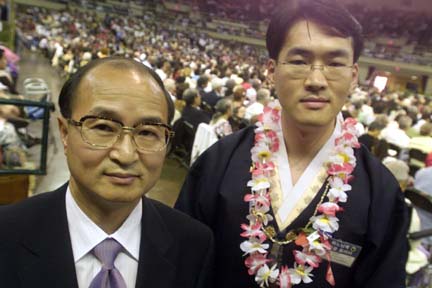
FL MORRIS / FMORRIS@STARBULLETIN.COM
South Koreans Woong Sup Woo, left, and Hyuk Kim were jailed in their country for their beliefs as Jehovah's Witnesses and for refusing to serve in the Korean military.
Jehovah’s Witnesses in
S. Korea endure prison
Woong Sup Woo and Hyuk Kim are not on the roster as speakers at the international convention of 10,000 Jehovah's Witnesses filling Blaisdell Center this weekend.
But their common story is frequently used in the church's publications as a testimony of practicing their faith. They have served time in prison, as have most of the other men in the 150-member delegation from South Korea.
"I refused to do military service," said Woo, 49, who was released in 1981 after five years' imprisonment. "Our belief in neutrality is based on the Bible."
"I would have liked to get more education," said Kim, 30, but instead he was imprisoned at the age of 20, released in 1995 after two years.
An estimated 10,000 Jehovah's Witnesses have served prison time since South Korea imposed conscription when the Korean War ended with a border to defend.
"About 750 of our brothers are in prison today, but the situation has been changing," Woo said.
There is increasing interest by international human rights organizations in the status of the conscientious objectors.
"Now we are appealing to take alternative duty," Woo said. As an example, he cited a pilot program in Taiwan in which men are assigned to foreign service posts abroad or other government assignments in lieu of military service.
Public interest within South Korea heightened in the past two years with the imprisonment of a 28-year-old Buddhist pacifist. News stories reported that he is a more sympathetic figure in the country with a long Buddhist history than the small church that is not widely recognized there. The Buddhist case has been appealed to the Constitutional Court.
Just three months ago, the government agreed to allow church speakers to hold teaching sessions in prisons, Woo said.
Woo, of Goyang city near Seoul, has worked as a teacher and a salesman. He does not wish to dwell on his prison experience.
"I was beaten many times and mocked as not being a good citizen," he said. "It was harder in my generation. I don't stop thinking about it because the situation hasn't changed."
Kim, of Anseong, is now a door-to-door preacher, an unpaid volunteer working out of a church branch office, where he also lives.
By the time of his imprisonment, the prison brutality was less. "I lived with criminals, but some of them respected our belief," Kim said.
Translator Young Joon Chun said Jehovah's Witnesses are denied many job opportunities, with corporations unwilling to hire them because of the prison record.
"It is ironic that about 60 years ago when Japan ruled Korea, we refused to salute the emperor and were put in prison," Chun said. "We were praised for our stand," which was based on the same belief in maintaining neutrality.
The convention, which brought 23,000 people from 10 countries to Honolulu, will continue through tomorrow. Sessions of Bible-based teaching from 9:30 a.m. to 4 p.m. are open to the public.
